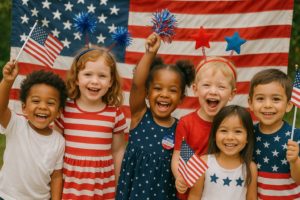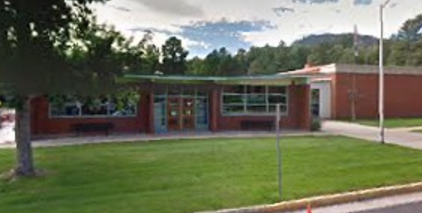Image created by ImageAI
As a child, did you ever experience an injustice or had someone use their size, age, or status to take something from you, or prevent you from taking your fair turn?
Fairness is an issue our co-learners at Creekside Kids protect as we work to ensure that all our kids know they have received fairness and, in turn, treat others with the same ethics and kindness.
As fireworks light up the sky this Fourth of July, we celebrate more than just a birthday. Independence Day is a chance to talk with our children about bravery, sacrifice, and the people who helped shape our nation—not just the names in history books but the everyday heroes walking among us.
From Capes to Courage: Superheroes and Real-Life Heroes
Kids love superheroes. From Spider-Man to Wonder Woman, these characters show courage, kindness, and a willingness to stand up for what’s right. But before there were superheroes in comics, there were real people who did heroic things—and they didn’t wear capes.
We’re living in an age where superheroes are celebrated and a massive part of our culture. On September 11th, 2001, Americans witnessed something so horrible and senseless, that we called back to a place where superheroes righted our wrongs, because we felt powerless in the enormity of the fall of the twin towers. We needed the superhero to right our wrongs at that moment. The legends of superheroes helped comfort us and give us a sense that someone, somewhere, would stand up for us.
Since then, the idea of the superhero has been the dominant genre on television and film. Culturally, we forgot that it’s the everyday person, the real person, who saves the day in this world, by standing up to aggression.
Talk to your children about:
Nathan Hale was a young schoolteacher who became a spy for the American colonies. When the British captured him, his final words were, “I only regret that I have but one life to lose for my country.”
Sybil Ludington, just 16 years old, rode twice as far as Paul Revere through the night to warn American troops that the British were coming. She wasn’t famous, but she was brave—and she acted when her country needed her.
Alexander Hamilton was an orphan who utilized his brilliant mind to contribute significantly to the Revolutionary War and helped shape the U.S. Constitution. He was very young, bold, and believed deeply in a better future.
Crispus Attucks, a free Black man, became the first person to die in the Boston Massacre. His courage made him the first casualty of the American Revolution—and a symbol of the cost of liberty.
John Paul Jones, a daring Navy commander who, in the middle of battle, shouted, “I have not yet begun to fight!” when asked to surrender. His bravery on the seas played a crucial role in helping America win its independence.
Even though most of these people were adults (many in their early 20’s), they didn’t have superpowers or immunity from prosecution or execution. They were ordinary people in extraordinary circumstances, who risked their fortune, their freedom, and their prosperity for the sake of others. And in the case of Sybil Luddington, she was still a child when she took an enormous risk for the liberty we enjoy today– showing that courage starts early.
Patriotism Isn’t Just Waving a Flag
Patriotism comes in many different forms, but it doesn’t mean blind obedience. The founders of our country were rebels who broke the laws of the British crown because they believed in something better: freedom, justice, and representation. They put these ideas down into a constitution, effectively declaring war on King George and the British empire. It’s important to teach our children that loving your country means wanting it to be its best self—even if that means standing up when something’s wrong.
Sometimes, what’s right isn’t easy. That’s what real patriotism is: choosing what helps others, even when it’s hard. And that can be as complex as election law or as simple as a snack extorted by a bigger child from a smaller child. The United States is a society where we value everyone and seek fairness for everyone, even if that means planting trees that we’ll never enjoy the shade of ourselves. Because our children are those trees, and they will need that shade someday.
Ordinary Heroes in Everyday Life
Today, we still have heroes—police officers who protect communities, firefighters who run into danger, EMTs who respond in emergencies, teachers who nurture minds, and neighbors who assist and care for us when no one is watching.
Ask your children:
- Who are the helpers in our community?
- What makes someone a hero?
- What’s something that you don’t like about the world (litter is a concrete example) and how can you help fix it?
These questions help children understand that, while they may be small, their actions can have a significant impact on the world around them.
If you’d like to discuss a place at Creekside Kids for your kids, we invite you to click this embedded link to schedule an appointment. Let’s get to know each other! Like us on Facebook to follow our stories for news and updates. We’re located at 1201 W Cheyenne Road, Colorado Springs, CO 80906, and we can be reached at (719) 635-9111. Our new hours of operation are 6:45 a.m. until 5:45 p.m., Monday through Friday.

 1201 W Cheyenne Rd
1201 W Cheyenne Rd